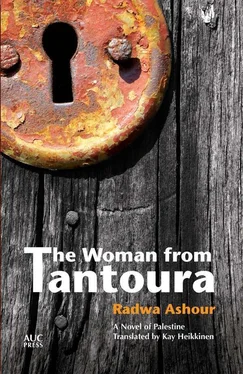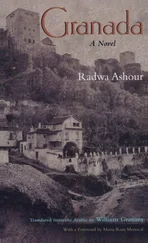Karima was laughing as she told the story. It’s strange, I remember everything she said that night, even though at the time it seemed like fleeting words, just like the rest of the talk. Then the story surfaced and became insistent. I thought, I’ll tell it to Maryam; then I wondered suddenly, am I preparing her? Perhaps, I thought to myself.
Maryam can snatch a thought from the air. When I told her the story, she commented, “You intend to do the same? You think that if a man over a hundred was able to do it, then I must be able to! Remember, Mama, that Karima was a child of five, and her grandfather who she thought was over a hundred might have been a man of sixty or even fifty-five; kids think like that, that old people are really, really old. Anyway wait until I graduate and I’ll go with you. We’ll buy two donkeys and just take off.” She said it and burst out laughing; I couldn’t take her laughter, I was furious.
At sixty or over a hundred or at Noah’s age, Noah who reached nine hundred, the man took his age in his hand, or on the back of a donkey, and did what he wanted. Neither the Israeli state nor its soldiers not the barbed wire on the border broke his will.
I’ll go back, like him. Not on the back of a donkey but by the logic of birds.
Fatima said, “The residents of al-Furaydis know the locations of the cemeteries.”
Yes, locations; the plural, not the singular. The old cemetery and the mass grave, and perhaps a third cemetery. If one of them went there with you he would point to part of the asphalt and say, “This is the mass grave, under the lot for cars, at the ‘parking.’” Ruqayya would put up a tent for herself at the parking lot. Oh my God, hold on, Ruqayya! A refugee, in a tent, in Tantoura? Where will I go then, to one of the tourist chalets on the seashore? Yes, the village has become a resort. Fatima gave me pictures and a CD that Maryam put into the computer, and I saw Tantoura, its sea and its islands and its palms and its Indian figs. Just as they were. What’s new? The chalets, the sailboats, fishing, fishing for pleasure and not for sustenance, and God only knows what else besides.
Fatima said, “At the entry of the school there’s a sign with the names of those who were killed.”
“The names of the martyrs?”
The ghost of a smile; I realized that the question was foolish.
“No, a sign with the names of their dead, killed the day of the battle. I did not take a picture of the sign or of the school, for fear that one of them would appear before me suddenly and confiscate the camera. The school has become a center for agricultural research.”
The pictures: the tomb of al-Jereini has stayed the same. Fatima said, “I found a woman praying. When she finished she greeted me and said, ‘They have no power over the sheikh or his tomb. No one can budge it.’”
I looked up and pointed, explaining to Maryam, “This was the glass factory.”
Fatima said, “Yes. They say that one of the Rothschilds, I don’t know which one, one of the Rothschilds visited the town in the forties and saw the vines. He said, ‘There’s a lot of value here, it must be put to work.’ He founded a glass factory, probably to bottle alcoholic beverages.”
“In my time it was an abandoned plant.”
“Now it’s a museum for glass. Then there’s this building, that has Arabic writing on it establishing the date when it was built.”
“This is the Yahya house, the most prominent family in Tantoura. Is anyone living there?”
“It’s dilapidated, just a façade and two or three rooms. Some of the young men from al-Furaydis use it to store their fishing equipment.”
“And the rest of the houses?”
Fatima was silent. I repeated the question.
“They were torn down.”
I look at the pictures, I look at them intently. Do the pictures nourish the logic of the birds? They transport me in a flash, with no checkpoints, no barbed wire, no armored soldiers; I just go. Then what — will I put up a tent, erecting it next to my family, in the parking lot, or will I live next to the Indian figs, each of us keeping the other company? When the guests leave I will scrutinize the pictures at length; while they’re with me I just look at them once, once only, then I take them and put them away in a drawer among Amin’s shirts. I know, I’m behaving oddly, I mean in keeping three of Amin’s shirts. I wash them from time to time, and iron them and fold them and put them back in their place in the clothes chest. Maryam noticed them some time ago, and then again when we moved to Alexandria. She was on the verge of asking about them, and then her face flushed and she left the room.
Abed said, as he welcomed Wisal by telephone, “On the news yesterday they announced an earthquake in Alexandria.”
“There wasn’t any earthquake. Or maybe a very small one — none of us felt it.”
“Auntie Wisal, you and my mother and Maryam and Fatima are all together in one place, and there’s no earthquake? How can that be?”
She understood the teasing and laughed.
We have coffee together in the morning, we go to the sea, we sit in a café overlooking it. Fatima talks about Lid, about her childhood and her parents. I ask her about Hasan and she tells me. Wisal makes us laugh, telling us about the Intifada and her children.
“They arrested all five of them. Even the girl, they picked her up too. This one they arrested for two days, that one two weeks or a month, the other one six months, then they arrest him again. A knock on the door at dawn has become familiar. They knock on the door and I open it and shout at them: ‘What’s your hurry? Are we going to run away — how? There’s only one door, and you’re standing under the windows. And where’s your shame? My daughter and I are in our nightgowns, can I open the door for you when we’re in our nightgowns? You should be ashamed!’”
“You talk to them like that?”
“Yes. The first time I thought I went too far, but then I learned that they’re usually young, and they blush. They already feel guilty, and when I scold them they feel it more. Of course, those are the kids; the officers and the special forces are another matter. They come to arrest a leader or one of the fedayeen, and they’re really violent. They hit you with the rifle butt right away, and that’s if they don’t fire first.”
“And the day they came to arrest you?”
“They came to arrest me. I said ‘Okay, but I won’t ride in an Israeli car.’ They yelled at me and I yelled at them. They were young conscripts, I wouldn’t have dared if they had been officers. I said, ‘Maybe in a taxi.’ They laughed, and said ‘Madwoman!’ I said, ‘Mad or not, I won’t ride in an Israeli car through the streets of Jenin, it would ruin my reputation! If my father were alive he would kill you and kill me, and say you’re eloping with my daughter.’ They didn’t understand ‘eloping.’ I was laughing at them, and I enjoyed it more because they didn’t know I was making fun of them. I said it again, ‘I will not ride in an Israeli car unless you tie me up and put me in it by force.’ Thank God I’m tall and heavy, no three of them would be able to lift me. I let myself go. They said, ‘Then walk.’ I went the whole way from the camp to the police station, walking calmly and with my head up, just like a queen. They were guarding me on both sides and the military car was coming behind me, slowly. I was laughing inside. I didn’t let it show because I didn’t want to get into real trouble, but it nearly got away from me when I saw some people I knew standing in the street. I saw the laughter in their eyes, and we understood each other perfectly. But I didn’t laugh.”
“Once on the night before Eid some young men from the camp climbed up and hung flags on the electricity wires. On the morning of Eid Palestinian flags were flying over the camp, as if it was a holiday for independence, and not for the end of Ramadan. It was like they were possessed, they came into the camp and swore and cursed. ‘Take down the flags!’ But the young guys had disappeared like salt in water, and the women said, ‘We can’t climb, you climb up.’ We stood watching while they climbed up and took down the flags, with every one of us praying secretly that they would fall and break their necks. God didn’t answer our prayers, except in one case. A soldier got clumsy on the pole and fell and landed on his snout, may God not help him. Who told him to oppress people and serve in an army of occupation?”
Читать дальше












